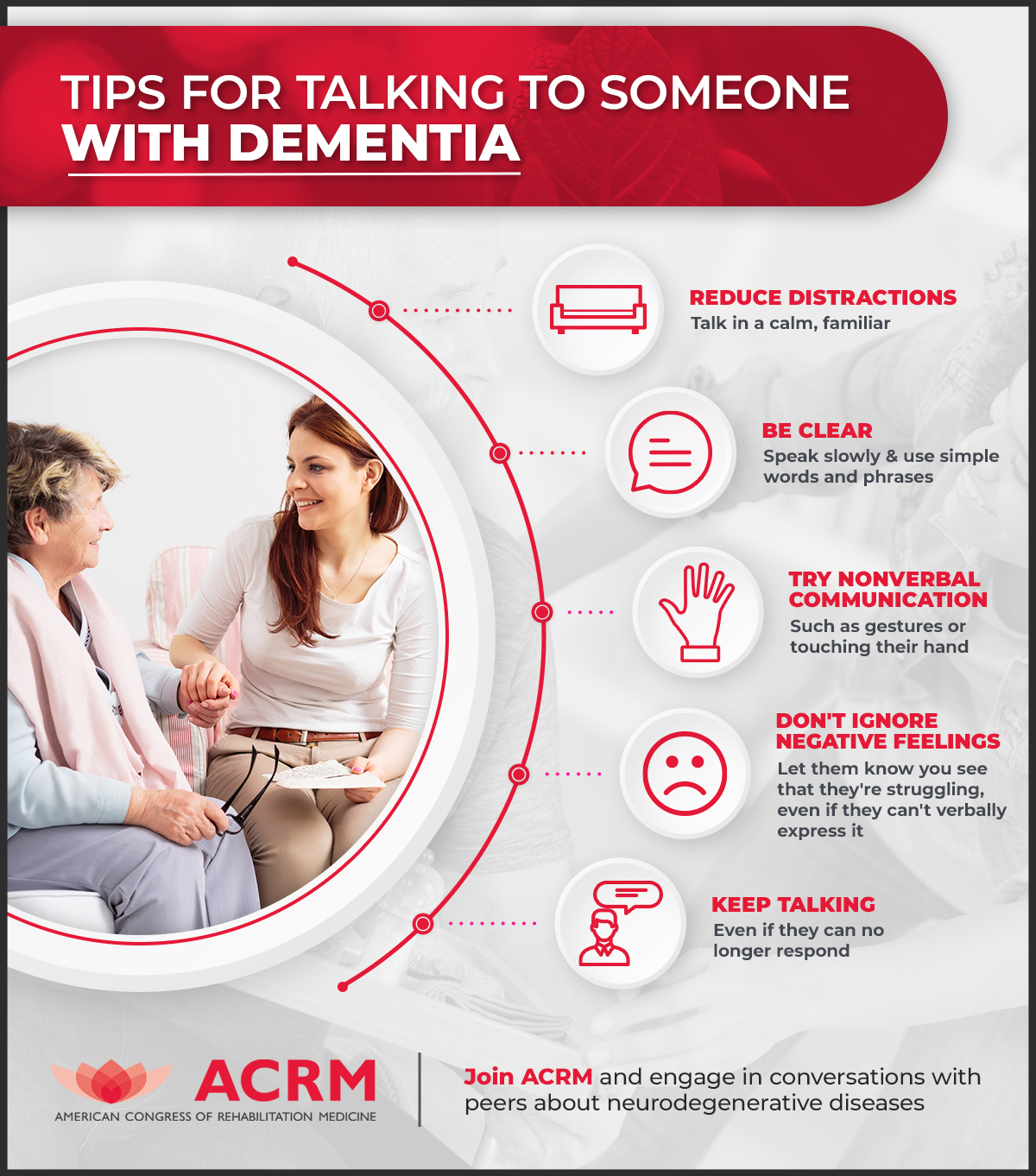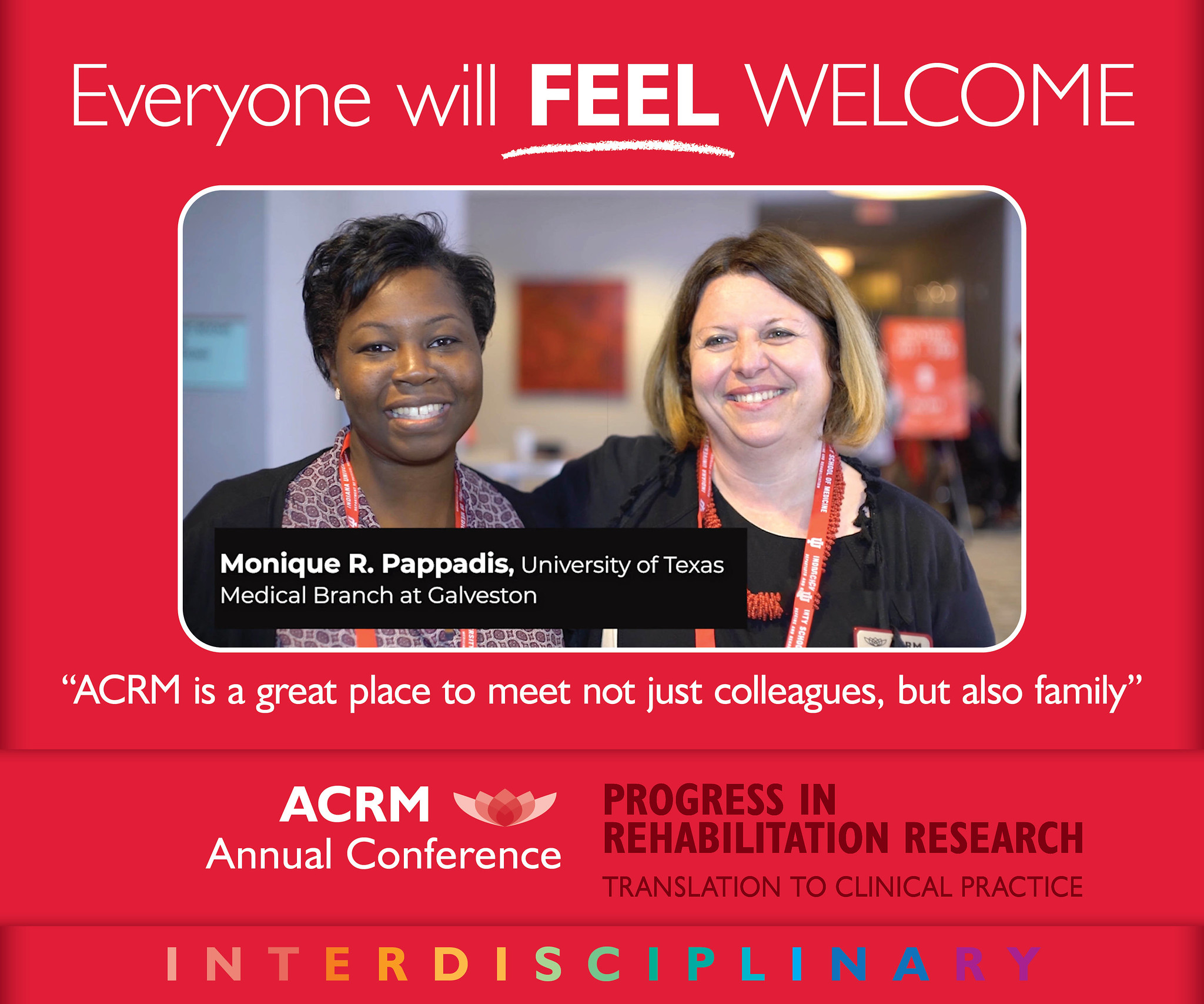A diagnosis of dementia, Alzheimer’s, or another neurodegenerative disease is difficult to cope with for everyone involved, including caregivers. Here at ACRM, we have a networking group that specifically focuses on neurodegenerative diseases, and within that community, members discuss advances in rehabilitation medicine and rehabilitation research related to these diseases. As one of the leading neurodegenerative disease groups in the US, the mission of the group is also to disseminate useful knowledge.
In today’s blog post, we’ll be sharing some general information for family members of people living with dementia, which hopefully you’ll find helpful! If you’d like to learn more about the neurodegenerative Diseases Networking Group (NDNG) or want to register for the ACRM Conference, contact us today.

Communicate
One of the most challenging symptoms of dementia is the way that the disease affects your loved one’s ability to communicate. Your loved one may not be able to tell you what they’re feeling or what they need. Communication challenges go both ways, too, and they may not understand what you’re asking. Miscommunication can be frustrating, but there are some ways to reduce stress:
- Be calm: try to keep your tone of voice and body language as calm and pleasant as possible. Try using other forms of nonverbal communication, like touch, to show that you’re there and trying your best to understand.
- Be clear: speak slowly and use simple words and phrases. You may have to repeat what you’ve said multiple times. Don’t get frustrated, and say the same sentence or ask the same question. Try to ask yes or no questions as much as possible, and avoid giving choices if there are none, as this can feel infantilizing for your loved one.
- Don’t ignore feelings: when you’ve had a long day or are exhausted from caregiving, you may feel like pushing through and pretending things are fine is the best way to get through the day. If your loved one is sad or angry, though, don’t ignore it. Let them know that you understand that they’re feeling bad, and you want to help. You can say something like, “I see that you’re having a bad day, let’s go for a walk and look at the neighbors garden.”
Take Care of Yourself
You’ve probably heard it a lot, but it’s worth repeating: you can’t care for someone if you’re at a breaking point or too tired or frustrated. Know that if you’re feeling exhausted, that’s normal. If you feel like you don’t even want to see your loved one day, that’s ok too. It doesn’t mean that you’re doing a bad job, it just means you need to take some time for yourself.
Remember that you don’t have to do it alone — ask for help from relatives, friends, and local organizations like churches or support groups. Find a caregiver support group and connect with others who are going through a similar experience. Together, you can brainstorm coping strategies. You can also consider respite care or adult daycare centers. If you can afford to do so, they can be a great way to both give you a break and also provide your loved one with a change of environment and a chance to socialize.
Managing Agitation
While the way that dementia will affect your loved one will be unique, most people with dementia have some form of agitation. Your loved one may be easily agitated, from things like a change in the surrounding, inability to communicate, or inability to do things that they may have been able to do before. Your loved one may cry, be angry, or even try to hurt someone.
Try to avoid loud noises and overstimulation. Keeping a calm environment where your loved one is surrounded by familiar faces will help ease fear and anxiety, decreasing agitation. Try to limit the number of challenging tasks that your loved one needs to do, and if there are difficult tasks (like going to an appointment or taking a shower) try to plan them for a time of day that is better for your loved one.
When dealing with agitation, try to set realistic expectations — both for your loved one and yourself. Supporting your loved one as they lose the ability to do things that they used to do is hard for everyone. You will have to take on more responsibilities, and your loved one can get agitated when tasks that used to be easy, like getting dressed, become difficult. Try to set expectations that make life easier for both of you. For example, instead of having your loved one get dressed alone, have them do one part of the outfit themselves and help them with the others.
ACRM – Rehabilitation Medicine
The mission of our non-profit organization is to improve the lives of disabled people through rehabilitation medicine and research, and that includes people with neurodegenerative diseases like dementia. Learn about the benefits of joining ACRM and register for our conference either in person or online here.











